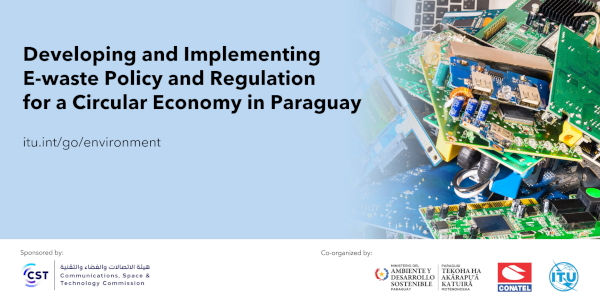
Background
In Paraguay, the management of e-waste is referred to in the Integrated Solid Waste Management Law. The overarching law outlines principles and responsibilities for prevention, reduction, reuse, recycling, treatment and final disposal of waste. ITU is supporting the Government of the Republic of Paraguay in the development of dedicated e-waste regulations.
The development of Paraguay’s e-waste regulatory framework is part of a two-years project with the Communications, Space and Technology Commission (CST), which aims for the sound implementation of national e-waste policy and regulations in Paraguay, Rwanda and Zambia. In Paraguay, regulatory developments were based off a series of consultation workshops and engagements with the public and private sectors and civil society. A draft decree and resolution on the post-consumer management system for electrical and electronic equipment (EEE) and endorsing the extended producer responsibility (EPR) was prepared and is subject to stakeholder validation.
Objectives
This validation workshop will offer the opportunity to gather inputs on the legal, administrative, and financial modalities of e-waste management in Paraguay by:
- Presenting to the stakeholders of the public and private sectors, academia, and civil society the most important aspects considered in the drafts of the decree and resolution on the Post-Consumer Management System of EEE (PMS-EEE) and Extended Producer Responsibility (EPR), for their validation.
- Obtaining suggestions and comments from the workshop participants, as a result of group work, on the documents that were provided to them before the event (drafts of decree and resolution), in order to make the necessary adjustments.
- Advancing in the process of refining the drafts of the decree and resolution, with the aim of obtaining documents adjusted to the particular conditions and needs of Paraguay, as well as to the existing related regulations in the country.
- Identifying best practices including the possible financing mechanisms, roles and responsibilities and barriers to be overcome to enhance public-private sector cooperation and to achieve optimal management of e-waste in the future.